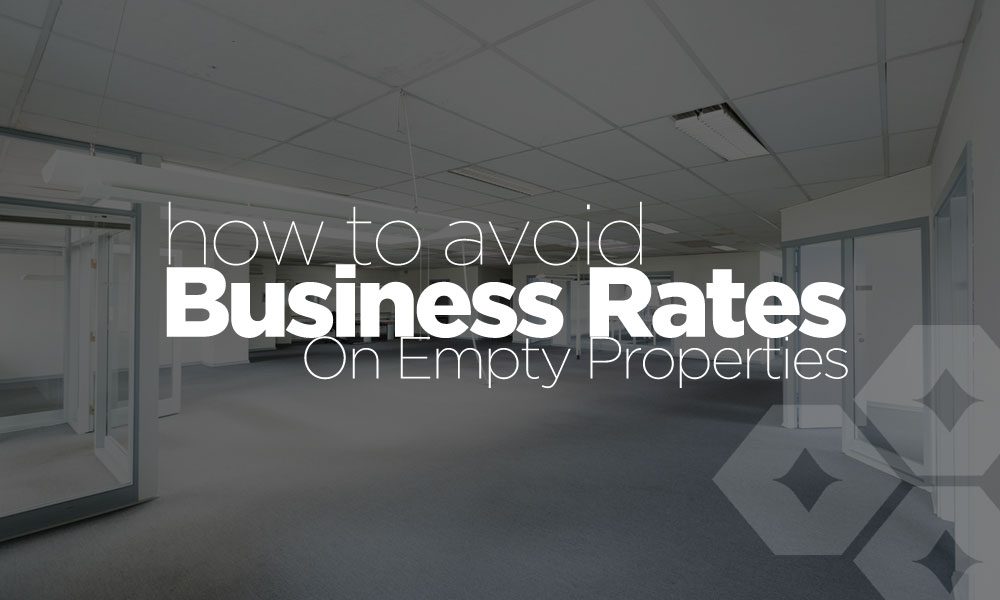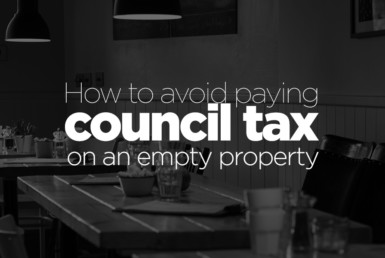How to Avoid Business Rates on Empty Properties

Paying hefty business rates for commercial properties that are not generating income is definitely a huge financial burden. This is why landlords are looking for ways to avoid business rates on empty properties. In 2008, the government reduced the rates relief period for a non-industrial property to 3 months and 6 months for an industrial property.
This was in a bid to motivate landlords to get their premises reoccupied fast and supply the rising demand without having to increase the development of commercial properties. This was also aimed at improving the standards of competition in the market.
Normally, tenants of commercial properties are the ones obligated to pay business rates. However, with this law, landlords of non-industrial property are expected to start paying full business rates 3 months after the tenant has vacated while industrial properties receive 6 months of relief.
This is a major point of concern for landlords since if they are unable to reoccupy their premises within this period, then it means that they will not only be getting no revenue but they will also be incurring huge expenses.

Business Rates Exempt Properties
There are certain properties, whether occupied or not, are completely exempt from business rates. This means that if your property is amongst these types, then you don’t have to worry about paying any business rates.
- Land that is used for agricultural purposes and the structures within. This also includes fish farms.
- Church halls and buildings that are registered for religious purposes
- Buildings that are meant for the welfare of the disabled people
It is, however, important to note that these exemptions only apply to properties in England. Exemptions in Wales and Scotland apply differently.
Empty Business Rates Exempted Properties
Sometime back business rates on empty properties did not apply to properties that had a rateable value of under £18,000. However, currently, exemptions from business rates apply to empty properties that have a rateable value of under £2,900. Exemption from business rates applies until they are reoccupied.
- Empty listed buildings receive exemption until they are reoccupied.
- Empty buildings that are owned by registered charities only receive exemption if it is established that once they are occupied again they will be used for charity purposes.
- Empty community amateur sports club buildings only receive exemption if in the future they will be used for sports. These properties are referred to as zero-rated properties.
Other Conditions That Exempt Empty Properties From Business Rates
- If the property owner has been declared bankrupt
- If the property is owned by a company that is in administration. However, if the company is still trading in the property, then it will have to pay the business rates.
- If the owner has been granted possession of the property in the capacity of a trustee under a contract.
- If the property is unfinished or in an economically irreparable state.

What Does This Mean For Property Owners?
If your property doesn’t fit any of the above-listed criteria, then after 3 months of being vacated (if it is non-industrial) or after 6 months (if it is industrial), then you will be forced to pay 100% of the business rates for the property. With the current economic conditions, finding tenants within the stipulated period of time is a major challenge.
However, even if the law seems strict on the landlords, there are numerous loopholes that the landowners are using, to their advantage, in order to avoid paying business rates on empty properties. Putting up these measures significantly helps to ease the financial burden that they would have otherwise endured. If you are receiving empty property rates bills or are worried about a property that is about to become vacant, then here are some methods you too can use.
Short Term Tenants
One of the most common techniques of avoiding to pay business rates on empty properties is finding tenants that are willing to occupy the property for at least 6 weeks. Once it is let or occupied, the tenant will be obliged to pay the business rates, however, after their lease is over and the property is left empty once again, your rates exemption period is renewed. The process can be repeated several times. In most cases, a reverse payable premium is usually considered which helps to reduce the liability of the tenant.
However, for this method to work, it must be proven that the property occupation is beneficial to the tenant and that there is some degree of permanence. Another main challenge of this method is finding temporary tenants, however, there are guardian services firms that are dedicated to providing guaranteed temporary property accommodation for a fee. If this is something you would like to know more about, you can contact us here at VPS to find out more about our property guardian and vacant property services. We can offer further information on empty property business rates avoidance, just fill out our contact form and we will get back to you.
The Property Owner Occupies
In some cases, the landlord themselves might act as temporary tenants. In this method, the landlord occupies the land for at least 6 weeks. Upon vacation, the landlord can claim a renewed rates exemption period. This technique can also be utilized repeatedly. However, same as the short-term tenant, the landlord has to prove that the property occupation is beneficial to them.
Letting To Charity
Letting out your property to charity is another effective measure that you can implement. It is worth noting that registered charities are only obliged to pay 20% of the full business rates. Therefore, provided they use the property for charity purposes only, then you might make an arrangement to pay for them the 20% may be through contributions. This is definitely a good deal instead of you having to pay the full 100% on your own.
Demolishing The Property
For a property to be business rates payable, then the occupation of the property must be beneficial to the occupier. In the worst-case scenarios, a property owner might choose to demolish the property in order for it to be less beneficial. However, this option should be chosen after a lot of considerations. A cost-benefit analysis should be properly done to avoid any regrets.
As you can see there are many costs to consider, you also have vacant property insurance, and also council tax to take into account. We’ve just publish a post all about how to avoid paying council tax on an empty property, check it out for more info.
There are many techniques for avoiding paying business rates on empty properties. However, some are more effective than others. The ones listed above are some of the best ways. However, only time will tell if the government will find ways to counter these measures.
Feel Free to contact us for more information using the form below:




Varoozh
3 April 2020 at 9:53 pm
Hi
I have a property which is derelict condition and been vacant since late 2013.
For the last 7 years I been borrowing to pay its 8k rent a year which has been back braking.
I have sent various letters and pictures to harrow council but they either ignored my letter or rejected.
Is there anything I can do?
VPS Guardians
4 April 2020 at 9:20 am
Thanks for contacting us Varoozh. We will contact you via email to see if we can help or give you some advice on your current situation.
Nin
23 April 2020 at 6:19 pm
Hi,
I have a property that has been empty since August 2019.
I have been unable to properly refurbish it and open it as I am constantly low on money due to paying the business rates, I estimate the shop needs at least a 20k investment to reopen again. The council has not been responding to me whenever I have emailed them about this issue. it has just been a constant loop of money going down the drain.
Is there anything I can do?
VPS Guardians
24 April 2020 at 6:59 am
Thanks for contacting us Nin. We will contact you via email to inform you about our solutions and to see if we can help or give you advice.
B Saunders
14 June 2020 at 11:46 am
I have been paying empty property rates of a £1600 per month for about a year. Difficult to let firstly because of uncertainty over Brexit and now because of the virus. It’s crippling The low threshold RV is of little help
Simon Lincoln
23 September 2020 at 6:45 pm
I have two buildings that we used to let, which have been empty for over eighteen months. The buildings are on a farm where we struggled to keep tenants as the internet was diabolical.
Both were B1, and now we have planning permission to convert into dwellings. The local council (Lewes) are still saying that we have to pay the business rates. I have argued for some time that I feel this is not correct, and now have a rate demand for the full amount, as I dug my heels in ,
and can’t now pay in instalments .
Any advice would be appreciated. Thank you.
VPS Guardians
24 September 2020 at 6:34 am
Thanks for contacting us Simon. We will contact you via email to see if we can help or give you advice.